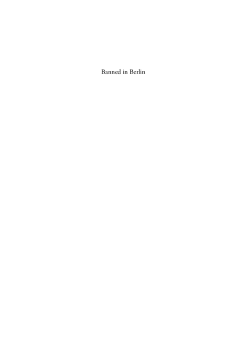
Additional Information
Book Details
Abstract
Imperial Germany’s governing elite frequently sought to censor literature that threatened established political, social, religious, and moral norms in the name of public peace, order, and security. It claimed and exercised a prerogative to intervene in literary life that was broader than that of its Western neighbors, but still not broad enough to prevent the literary community from challenging and subverting many of the social norms the state was most determined to defend. This study is the first systematic analysis in any language of state censorship of literature and theater in imperial Germany (1871–1918). To assess the role that formal state controls played in German literary and political life during this period, it examines the intent, function, contested legal basis, institutions, and everyday operations of literary censorship as well as its effectiveness and its impact on authors, publishers, and theater directors.
Gary D. Stark is currently Professor of History and Associate Dean of Liberal Arts & Sciences at Grand Valley State University in Michigan. Previously, he was Professor of History, University of Central Arkansas (1994–1998) and Assistant and Associate Professor of History, University of Texas at Arlington (1975–1994), where he also held decanal positions. He is the author of Entrepreneurs of Ideology: Neoconservative Publishers in Germany 1890-1933 (University of North Carolina Press) and of numerous articles on late nineteenth and early twentieth century German cultural history. He co-edited with Bede K. Lackner, Essays on Culture and Society in Modern Germany (College Station: Texas A & M University Press, 1982).
“Stark has produced a lucid, thoroughly researched study of literary censorship in Wilhelmine Germany, i.e., the period from the founding of the Second Reich in 1871 to the end of WW I. Including an excellent bibliography, much of it in German, and elegant illustrations with English translations, this book may be the final word on this subject. Highly recommended.” · Choice
“This is a study on the grand scale of literary censorship throughout the German Empire… In his admirable introduction, Stark gives a brief summary of the burgeoning field of censorship studies and…indicates his desire to get away from the shortcomings of traditional censorship studies by avoiding a one-dimensional critique of censorship, and in this the author succeeds admirably, not condemning censorship but subjecting it to an extremely thorough analysis, underpinned by extensive archival research… Overall, Banned in Berlinis a landmark study of censorship in Imperial Germany, which will be a standard reference point for experts as well as the general reader.” · Clio: A Journal of Literature, History and the Philosophy of History
“…a thorough and absorbing study of literary censorship in imperial Germany…a succinct and scholarly account of ‘repressive interventions’ in the literary sphere ” · European History Quarterly
“Gary Stark has written a sophisticated and richly informative study of German censorship. The volume is not only a great introduction to the media and cultural production of Imperial Germany, but also a thoughtful primer on the general significance of censorship …a marvellous book that should become a standard work in the historiography of Imperial Germany ” · English Historical Review
“Stark offers a convincing and differentiated picture based on wide ranging closely examined source material · Historische Zeitschrift
“Gary Stark has given us a wide-ranging and perceptive treatment of relationships between the state and culture in the Kaiserreich. It ought to be read not just by those who are interested in the histories of literature, the theater, and censorship, but by anyone who is interested in the ongoing struggles between the forces of authority and the forces of freedom during the late 19th and early 20th centuries” · German Studies Review
"...a rich and meticulously researched study…[The author] has set the highest standard for future works on the topic. · German History
"[T]his book is the product of an exemplary research effort: it draws on the holdings of an impressive array of archives, as well as a daunting quantity of published sources…The endnotes at the end of each chapter testify to the thoroughness of Stark's research and will be invaluable to anyone trying to follow him in this field." · H-German
"There has long been a need for a comprehensive, reliable English-language account of censorship in Imperial Germany. This task has now been accomplished in this superbly researched and spritely written volume, which synthesizes the fruits of decades of research in numerous German archives and comprehensive reading of German and other secondary sources." · Robert Justin Goldstein, Emeritus Professor of Political Science at Oakland University and Research Associate at the Center for Russian & E. European Studies at the University of Michigan at Ann Arbor.
“This is a smart, shrewd, well-observed study of censorship in Imperial Germany that illuminates broad aspects of German society and its political and religious divisions. A very deft, intelligent analysis.” · Peter Fritzsche, University of Illinois
“…a comprehensive survey of censorship of literature and the stage spanning the years 1871 to 1918. It is truly a scholarly ‘life’s work,’ and there is no volume like it, even in the German language. Banned in Berlin is the product of prodigious research: not only does it cover the relevant printed sources, but it draws upon a wealth of unpublished materials from numerous archives scattered across Germany. · Peter Jelavich, Johns Hopkins University
